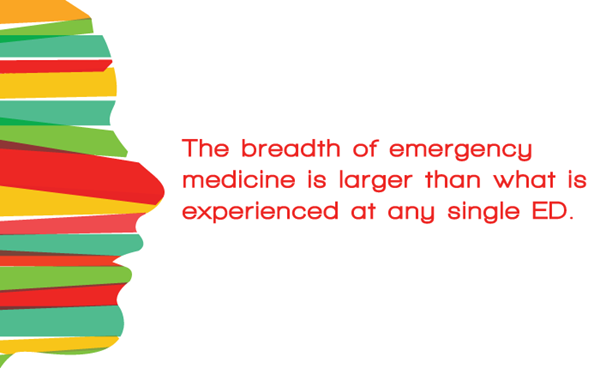The knowledge base required for clinical expertise in emergency medicine is immense. Even after decades of practice, it is still routine to hear seasoned emergency physicians make comments on novel case presentations. Whether you're a medical student on your first emergency medicine rotation, a newly anointed intern, or a recent residency graduate, the fund of knowledge necessary for successful clinical practice is daunting. While podcasts, lectures, textbooks, journals, and academic blogs supplement your education, there is no equivalent to clinical practice.
The vast majority of emergency medicine residency programs are affiliated with major academic medical centers, yet most residency graduates are employed at community hospitals. The experience with which residents are exposed to community medicine, in addition to other non-required rotations such as orthopedics and toxicology, during graduate medical education training is variable. Inevitably, the geographic location of a residency program will also predispose its trainees to a unique breadth of pathology, from snakebites and altitude sickness to sickle cell disease and malaria. Regardless of the training you receive in residency, you will graduate having never encountered hundreds of clinical disorders you are expected to recognize and treat.
Currently I work in four different emergency departments — an adult and a separate pediatric emergency department at a tertiary care, level one trauma center; an emergency department at the only VA hospital in the state; and a single-coverage emergency department in a rural community. While the scheduling and maintenance of credentials at each hospital can be cumbersome, as a recent residency graduate, the educational benefits are immeasurable. The clinical pathology I encounter at each site is unique. At the tertiary care referral center, I see a larger volume of trauma, and I routinely manage complex medical and surgical patients who ultimately require sub-specialty care. While the management of these patients is intellectually challenging, it is inherently different from the clinical practice experienced at the VA hospital emergency department, where much of this unique population presents in acute exacerbations of often poorly-controlled chronic diseases, such as congestive heart failure, COPD, and diabetes. A typical workday in this emergency department involves diagnosis and management of arrhythmias, sepsis, and many other “bread and butter” fundamental competencies that define emergency medicine as a specialty. Separate from these experiences, the patients I treat at my rural, community job run the gamut in their severity of illness. While these patients may lack the medical complexity of a typical patient seen at the university or VA hospitals, there is often a high level of acuity.
Equally important to the diversity of pathology is the variation in clinical practice. While an elbow dislocation typically results in the involvement of an orthopedic consultant at the academic medical centers, both sedation and orthopedic management are routinely performed by the sole emergency department practitioner in the community setting. Each clinical setting affords the chance to improve the way we practice emergency medicine. From working with different EMRs, to managing patients independently or as a part of a larger interdisciplinary team, to learning the art of transferring patients or working with consultants, diversifying your clinical portfolio will make you a stronger physician.
It is important not to overburden yourself during your first years after residency. The larger paychecks often incentivize young physicians to work more shifts to help pay off debt, yet inevitably the stress and fatigue of the emergency department catches up with us all. While there is no magic number of shifts to work per month to reduce burnout, we all have our own idea of what feels comfortable.
Graduate residency. Take your dream job and work there for a few months. However, once you've settled in I encourage you to push past your comfort zone and moonlight at a hospital that exposes you to a completely different clinical setting, be it rural, urban, community, or academic. The breadth of emergency medicine is larger than what is experienced at any single emergency department. Increasing the variety of your experience will make you a more competent and confident emergency physician, and will lead to a more fulfilling career.



